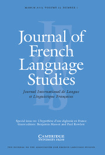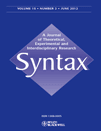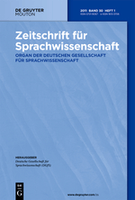
Acta Linguistica Academica
Scope & Guideline
Championing Accessibility in Linguistic Scholarship
Introduction
Aims and Scopes
- Syntactic and Morphological Analysis:
The journal frequently explores the structures and rules governing syntax and morphology, often through case studies in Hungarian and comparative analyses with other languages. - Pragmatics and Sociolinguistics:
Research in this area examines the use of language in social contexts, including studies on small talk, phatic interaction, and sociopragmatic features across different cultures. - Language Acquisition and Processing:
Papers often investigate how language is acquired and processed, with a focus on bilingualism and the cognitive aspects of language learning. - Cross-linguistic Perspectives:
The journal promotes studies that draw comparisons between languages, shedding light on universal grammar and language-specific phenomena. - Historical and Diachronic Linguistics:
Contributions often include historical analyses of language change over time, particularly in the context of Hungarian, providing insights into the evolution of linguistic structures.
Trending and Emerging
- Neural Linguistics and Machine Learning:
There is an increasing focus on the application of neural networks and machine learning techniques to linguistic problems, particularly in areas such as machine translation and language modeling. - Cross-Cultural Pragmatics:
Emerging studies are exploring how language usage varies across cultures, with a specific emphasis on small talk and phatic communication, reflecting a growing interest in sociolinguistic dynamics. - Dynamic and Contextual Language Theories:
Research is moving towards theories that account for language as a dynamic and context-dependent phenomenon, including discussions around representationalism and contextual semantics. - Language and Technology Interactions:
Papers are increasingly addressing the intersections between language and technology, particularly in the context of language processing and computational linguistics. - Morphosyntactic Variation and Change:
A trend towards understanding morphosyntactic variation and its implications for language theory is emerging, particularly in the context of Hungarian and other Uralic languages.
Declining or Waning
- Phonological Studies:
Research specifically focusing on phonological aspects, such as sound change and phonetic analysis, has decreased in frequency, possibly due to a shift towards more syntax and morphology-centered studies. - Traditional Language Teaching Methods:
There is a noticeable decline in papers discussing conventional language teaching methodologies, reflecting a broader trend towards innovative and technology-integrated approaches in language education. - Comparative Syntax of Lesser-known Languages:
While comparative studies are still present, there seems to be a waning interest in exploring the syntax of lesser-studied languages in favor of more established languages such as English and Hungarian.
Similar Journals

Studia z Filologii Polskiej i Slowianskiej
Advancing Knowledge in Slavic Language StudiesStudia z Filologii Polskiej i Slowianskiej is a prominent journal published by the Polish Academy of Sciences, Institute of Slavic Studies, focusing on the rich and diverse field of linguistics and language studies, particularly within the Slavic context. With the ISSN 0081-7090 and E-ISSN 2392-2435, this open-access journal has been a valuable resource for researchers, professionals, and students since its transition to an open-access model in 2014. It features rigorous peer-reviewed articles that contribute to the understanding of linguistic phenomena and cultural narratives across Slavic languages. Recognized within the Q3 quartile of linguistics and language in 2023, it ranks at the intersection of arts, humanities, and social sciences, providing insights that echo through disciplines such as sociolinguistics, psycholinguistics, and philology. In its ongoing publication trajectory from 2011 to 2023, Studia z Filologii Polskiej i Slowianskiej continues to foster academic discourse and collaboration, positioning itself as a key player in the global linguistic community.

Language and Linguistics Compass
Navigating the Complexities of Language and CommunicationLanguage and Linguistics Compass, published by Wiley, stands as a premier journal in the field of linguistics, showcasing innovative and interdisciplinary research. With its ISSN 1749-818X and E-ISSN matching, the journal has built a robust reputation, achieving an impressive Q1 ranking within the linguistics category for 2023, placing it in the top 4% of its field. Its Scopus rank of 48 out of 1167 highlights its influence and significance among linguistics journals, boasting a commendable 95th percentile. This journal serves as a vital resource for researchers, professionals, and students, offering a wide range of accessible articles that illuminate current trends and advances within the domain of language studies. Although it is not Open Access, the journal is committed to quality and diversity in its publications, ensuring scholarly articles from various sub-disciplines of linguistics are represented from 2008 through 2024. Located in the United Kingdom, Language and Linguistics Compass invites contributions from around the globe, reinforcing its status as a leading forum for linguistic discourse.

SKASE Journal of Theoretical Linguistics
Empowering Linguistic Inquiry and DiscoverySKASE Journal of Theoretical Linguistics, published by the SLOVAK ASSOCIATION STUDY ENGLISH-SKASE, is a distinguished Open Access journal that expands the horizons of linguistic research and theoretical frameworks. With its ISSN N/A and E-ISSN 1336-782X, the journal has established itself as a pivotal resource for scholars in the field, achieving a commendable Q2 ranking in Linguistics and Language as of 2023. The journal, which has been in continuous publication since 2017, actively publishes innovative research studies, reviews, and theoretical discussions, easing access to groundbreaking work for academics and practitioners alike. Based in Slovakia, it connects a rich heritage of linguistic scholarship and is indexed in Scopus, ranking alongside its peers in both Arts and Humanities and Social Sciences categories. The SKASE Journal of Theoretical Linguistics is crucial for anyone interested in the evolving landscapes of linguistics, serving as an invaluable platform for disseminating knowledge and fostering collaboration amongst researchers worldwide.

NEUPHILOLOGISCHE MITTEILUNGEN
Illuminating Contemporary Discussions in LanguageNEUPHILOLOGISCHE MITTEILUNGEN, published by the esteemed Modern Language Society, stands as a significant contribution to the domain of Language and Linguistics. With a history dating back to 1971, this journal has consistently provided an academic platform for researchers and scholars, navigating through the intricacies of philology and linguistic studies. Although it is indexed in Scopus with rankings reflecting its position in the Arts and Humanities and Social Sciences categories, it currently does not offer Open Access, which may require interested parties to seek institutional access for its wealth of content. The journal has experienced periods of coverage discontinuation in recent years, yet it remains a valued source for advancing the understanding of language theories and linguistic practices. Its location in Helsinki, Finland, offers a unique European perspective on global linguistic issues. The journal is ideal for those looking to engage with evolving linguistic trends and contribute to contemporary discussions in the field.

Journal of French Language Studies
Illuminating Innovative Research in French LinguisticsJournal of French Language Studies, published by Cambridge University Press, is a prestigious and leading journal in the field of linguistics and language that provides a platform for scholarly articles and research findings relevant to the French language and its various dimensions. With an impressive Q1 ranking in the 2023 categorization and ranked #257 out of 1088 in Scopus for Language and Linguistics, this journal plays a pivotal role in advancing the study of French linguistic methodologies, sociolinguistics, and applied linguistics. Since its inception in 1991, the journal has continually contributed to the academic community, attracting innovative investigations and theoretical discussions that enrich understanding and research in the field. Researchers and students enjoy comprehensive access to critical analysis and emerging trends, and as it continues to converge towards 2024, the journal promises to remain an essential resource for exploring the evolving landscape of French language studies.

Syntax-A Journal of Theoretical Experimental and Interdisciplinary Research
Fostering Cutting-Edge Research in Theoretical and Experimental LinguisticsSyntax - A Journal of Theoretical Experimental and Interdisciplinary Research is a premier journal dedicated to advancing the field of linguistics, serving as a platform for high-quality research that spans theoretical, experimental, and interdisciplinary dimensions. Published by Wiley and located in the United Kingdom, this journal holds a prestigious Q1 ranking in the Linguistics and Language category as of 2023, highlighting its significance and impact within the academic community. With an impressive Scopus ranking of Rank #204/1088 in Arts and Humanities and Rank #239/1167 in Social Sciences, the journal occupies an influential position among leading publications, appealing to researchers, professionals, and students alike. Syntax encourages innovative studies that contribute to our understanding of language structure and use, making it an essential read for anyone invested in linguistic research. Although the journal is not Open Access, its commitment to rigorous scholarship ensures that it remains a vital resource for those exploring cutting-edge theories and empirical findings in the dynamic field of linguistics.

Lingue e Linguaggio
Navigating the Complexities of Linguistic PhenomenaLingue e Linguaggio, published by SOC ED IL MULINO, is a distinguished academic journal in the field of Linguistics and Language, hailing from Bologna, Italy. With an esteemed Q2 ranking in its category as of 2023, this journal is recognized for its contributions to both the arts and humanities as well as social sciences, achieving notable positions within Scopus rankings. It serves as a vital platform for researchers, practitioners, and students interested in exploring various linguistic phenomena, language dynamics, and theoretical frameworks. Although it operates under a traditional subscription model rather than open access, its comprehensive array of studies and publications provides significant insights and fosters academic discourse. With a publication period extending from 2002 to 2024, Lingue e Linguaggio continues to be a key resource for advancing the understanding of language in contemporary contexts.

Linguistica e Filologia
Illuminating the Ties Between Language and Culture.Linguistica e Filologia is a prominent academic journal published by UNIV DEGLI STUDI BERGAMO that offers an Open Access platform since 2002, fostering scholarly communication in the fields of linguistics, philology, and comparative literature. With a commitment to advancing understanding in these disciplines, the journal serves as a vital resource for researchers, professionals, and students alike. Its content encompasses diverse theoretical and empirical studies, critiques, and analyses of language and literature, encouraging interdisciplinary dialogue. Hosted in the picturesque city of Bergamo, Italy, the journal aims to bridge gaps between historical and contemporary linguistic practices, enhancing the global discourse on language studies. With a focus on quality, transparency, and accessibility, Linguistica e Filologia plays a crucial role in shaping the future of linguistic scholarship and is an invaluable reference for anyone interested in the intricate relationships between language and culture.

Zeitschrift fur Sprachwissenschaft
Fostering interdisciplinary insights into the world of linguistics.Zeitschrift für Sprachwissenschaft, published by DE GRUYTER MOUTON, is a leading journal in the field of linguistics that has been contributing to scholarly discourse since its inception in 1982. With an ISSN of 0721-9067 and an E-ISSN of 1613-3706, the journal offers an Open Access model since 2017, ensuring widespread dissemination of research findings. Positioned in Q2 of the Linguistics and Language category for 2023, it ranks #312 out of 1088 in the Arts and Humanities and #370 out of 1167 in Social Sciences, reflecting its robust impact and contribution to the field. This German-based journal covers a diverse range of topics related to language and linguistics, appealing to researchers, professionals, and students alike. By fostering interdisciplinary dialogue and showcasing innovative research, Zeitschrift für Sprachwissenschaft plays a critical role in advancing our understanding of language in various contexts. The journal is located at Genthiner Strasse 13, 10785 Berlin, Germany, inviting scholars globally to contribute to its mission of enhancing linguistics research.

JOURNAL OF PSYCHOLINGUISTIC RESEARCH
Pioneering Discoveries in the Realm of PsycholinguisticsJOURNAL OF PSYCHOLINGUISTIC RESEARCH is a premier scholarly publication dedicated to the interdisciplinary exploration of language and cognition. Established in 1971 and published by Springer/Plenum Publishers, this journal serves as a vital platform for researchers in Experimental and Cognitive Psychology, Linguistics, and related fields. With an impressive reputation reflected in its 2023 Category Quartiles—Q3 in Experimental and Cognitive Psychology, Q1 in Linguistics and Language, and Q2 in Psychology (miscellaneous)—the journal ranks prominently within the Scopus database, reaching the 88th percentile in Language and Linguistics. Researchers and professionals have the opportunity to disseminate their findings effectively, enriching contemporary understanding of psycholinguistic phenomena through rigorous peer-reviewed articles. Although currently not an open-access journal, it provides extensive access options that cater to a global audience, ensuring that the latest research is readily available to those dedicated to advancing this dynamic field. We invite scholars, practitioners, and students to engage with this essential resource for fresh insights and innovative research methodologies.